China’s military does not yet have the capability to deploy its power quickly on a global scale. But economically, it’s well on its way.
Chinese companies are quickly—and quietly—amassing assets abroad. China’s outbound M&A activity for the first nine months of 2016 totaled $174 billion, according to Dealogic data, surpassing that of the United States for the first time.
The breadth of Chinese M&A has been growing beyond traditional resource-related industries into high technology, transportation, media, and consumer products. The state-sanctioned expansion of Chinese companies aims to deploy Beijing’s soft power and grow its influence over global consumers.
The recent acquisitions aren’t driven by state-owned enterprises. More recent expansion has an eye towards an economic shift away from resources to value-added growth and services sectors. A handful of private companies are leading the charge, fronted by bold entrepreneurs and backed by creative financing.
“Because of rising labor costs in China, companies in the country are eager to migrate to high-value-added production and expand their presence, especially to emerging markets,” according to a Moody’s Investors’ Service research report last week.
We take a look at the five Chinese companies—all privately owned but well connected with the Chinese regime—on the forefront of China’s global expansion.
Anbang Insurance
Anbang Insurance Group’s first foray into international spotlight was its failed $14 billion bid to purchase Starwood Hotels and Resorts.
But that hasn’t stopped Anbang from leaving a mark in the U.S. hotels business. It recently closed on a $6.5 billion portfolio of 16 luxury hotels across the country—including the iconic JW Marriott Essex House on Central Park South—previously held by U.S. private equity firm Blackstone Group. It was the most expensive real estate deal by a Chinese company ever.
Anbang’s in the midst of a $13.5 billion shopping spree dating back to 2014, beginning with a $2 billion purchase of the Waldorf-Astoria hotel in Manhattan. The acquisitions spanned companies and properties from South Korea to the Netherlands.
Anbang is a private financial services company that’s been little known until recently even in China. It began operations only 12 years ago as a regional insurance company based in Beijing. Recent insurance sales have given the company the premiums to backstop its acquisitions. But unlike most insurers who invest in bonds, much of Anbang’s assets are tied up in long term illiquid properties that could put the company in a liquidity bind should liabilities become due unexpectedly.
Another mystery is Anbang’s ownership. The company’s ownership structure contains dozens of layers of entities owned by various people from far flung places. But they all have one thing in common of being relatives or business associates of Anbang Chairman Wu Xiaohui, according to a recent New York Times report. Wu, whose wife is the granddaughter of 1980s Communist Party secretary Deng Xiaoping, is curiously not listed as a shareholder of the company. Anbang has since refuted the report.
WH Group
Few U.S. consumers are aware that China’s WH Group is a supermarket staple in the United States.
WH Group owns two main subsidiaries Shuanghui Development and Smithfield Foods, making it the world’s largest pork producer and China’s biggest meat producer.
The company is results of Shuanghui’s $7.1 billion hostile takeover of American pork producer Smithfield Foods, which owns food brands such as Farmland Pork, Nathan’s Famous, and its namesake Smithfield. The deal brought more U.S.-produced pork and pork products to China, where food safety has become an issue in recent years.
Chinese officials last month partially lifted a 13-year ban of U.S. beef, allowing certain beef imports from cattle younger than 30 months.






